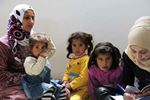Social Watch E-Newsletter - Issue 356 - November 8, 2019
Published on Fri, 2019-11-08 15:47
 |
| Issue 356 - November 8, 2019 |
|
|
Social Watch reports
Spotlight report on the 2030 Agenda
|
|
|
| |
|
| |
The IMF’s role in economic governance: conducive to reducing inequalities within and among countries?
|
| |
|
| |
Increasingly, the International Monetary Fund (IMF) is claiming a role for itself as a central player in the implementation of the 2030 Agenda, and has positioned itself as an important actor on SDG 10 and tackling inequalities (economic and gender-based). However, in practice this commitment has been patchy at best, with little evidence of any meaningful policy realignment. Drawing on the examples of Egypt and Brazil, Kate Donald and Mahinour El-Badrawi, from CESR, and Grazielle David from the University of Campinas, show how IMF governance has led to deepening of social and economic inequalities, and threats to human rights enjoyment. Read more
|
| |
|
| |
|
| |
Lebanon: The roots of revolution
|
| |
|
| |

Photo: UNHCR/F.Juez
|
The official Lebanese VNR report of 2018 blames the Syria crisis for the economic deficits that increased the debt, as well as for economic stagnation, the doubling of unemployment and worsening poverty rates. Yet, according to the alternative civil society report by the Arab NGO Network for Development (ANND), “this exclusively negative narrative about Syrian refugees does not distinguish between the huge impact of the Syrian crisis/war on the economy and political situation in Lebanon, and the diversified impact of the presence of the Syrian refugees in Lebanon. This latter allowed financial flow of aids to increase, as well as the domestic consumption that produced around 1 -1.5 percent of GDP growth, and provided a cheap labour force that prevented the bankruptcy of many small businesses.”
Thus “the Syrian crisis cannot overshadow the negative impacts of the long-implemented economic and social policies as well as the loopholes created by the lack of transparency and accountability. Read more
|
| |
|
| |
|
| |
In Paraguay personal and corporate interests of the powerful prevails
|
| |
|
| |
Paraguay has a history of “very low government revenue, generalized reluctance to pay taxes in a climate of corruption and strong opposition by enterpreneurs and high income earners to any increase in their fiscal contributions”, reports Decidamos, Campaign for Citizens' Expression.
One of the few tax increases that the public accepts are the taxes on tobacco, as they generate revenue but also address a public health problem. Yet, a proposed law to increase taxes on tobacco to 40 percent was vehemently opposed by the producers and by former president Horacio Cartes (2013-2018), who owns the biggest tobacco company in the country. Read more
|
| |
|
| |
Social Watch publishes country reports 2019
Social Watch coalitions around the world are contributing their assessments and reports to the global Social Watch report 2019 on the national implementation of the 2030 Agenda. While circumstances and capabilities are unique in each country, common threads emerge: Inequalities, often exacerbated by the international policy framework, are not being reduced, poverty is underestimated or hidden but not eradicated, sustainability is sacrificed to extractivism.
The Social Watch national platforms are independent coalitions of civil society organizations struggling for social and gender justice in their own countries. The Social Watch network has been publishing since 1996 yearly reports on how governments implement their international commitments to eradicate poverty and achieve equality between women and men.
|
| |
|
| |
|
| |
United Nations: ODA, blended finance insufficient to achieve SDGs
|
| |
|
| |
 |
Official development assistance (ODA) and blended finance alone are insufficient in both quantum and nature to enable the finance needed to achieve the Sustainable Development Goals (SDGs), according to the UN Conference on Trade and Development (UNCTAD).
This is one of the main conclusions highlighted by UNCTAD in a Secretariat Note presented at the third session of the Intergovernmental Group of Experts on Financing for Development taking place from 4-6 November.
"On current trends towards leveraging public funds to attract private finance, low-income developing countries and the least developed economies seem to be losing out, alongside efforts to ensure environmental protection through longer-term investment in developing countries routinely affected by natural disasters."
This requires concerted efforts in the North to meet their original commitments and reinvigorate international development cooperation through transparent and effective non-concessional resource transfers to the South, said UNCTAD. Read more
|
| |
|
|
|
| |
|
SOCIAL WATCH IS AN INTERNATIONAL NGO WATCHDOG NETWORK MONITORING POVERTY ERADICATION AND GENDER EQUALITY Social Watch >>
Social Watch E-Newsletter For comments, sugestions, collaborations contact us at: socwatch@socialwatch.orgTo stop receiving this newsletter send a message with the subject "unsubscribe" to: socwatch@socialwatch.org |
|
|
|
SUSCRIBE TO OUR NEWSLETTER
Submit
|
